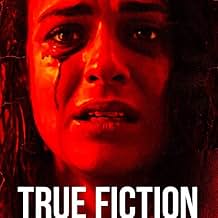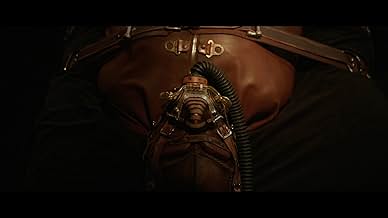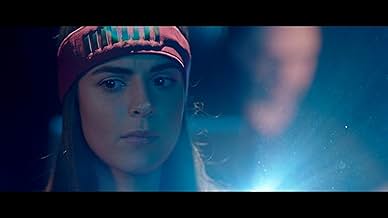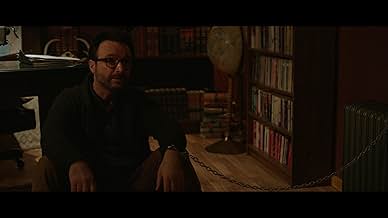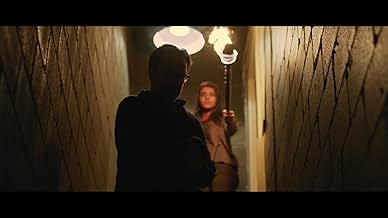AVALIAÇÃO DA IMDb
5,0/10
961
SUA AVALIAÇÃO
Uma jovem escritora consegue um emprego para ser assistente de seu autor de terror favorito, mas acaba participando de um terrível experimento psicológico.Uma jovem escritora consegue um emprego para ser assistente de seu autor de terror favorito, mas acaba participando de um terrível experimento psicológico.Uma jovem escritora consegue um emprego para ser assistente de seu autor de terror favorito, mas acaba participando de um terrível experimento psicológico.
- Prêmios
- 1 vitória e 6 indicações no total
Avaliações em destaque
And "deadly" - for your sanity and other "things". Now the German title of the movie got a tag line that some may say is quite the spoiler ... at least it indicates something that already gives you a view into what you are about to watch. German title "givers" like to do stuff like that ... explaining or spoiling a movie ... it is what it is.
The movie may have a slow pace at the beginning, but once it gets going ... it really gets going! And yes there is only a binary choice when it comes to guessing where this leads ... so no cookie for you if you guess it right. Still this can be entertaining, while also straining and exhausting! Yes the main characters seem despicable to say the least ... or not likeable ... but if you wrap your head around that, if you suspend your disbelief ... this can be the horror/thriller you can dig and be entertained by (not literally, you know what I mean).
The movie may have a slow pace at the beginning, but once it gets going ... it really gets going! And yes there is only a binary choice when it comes to guessing where this leads ... so no cookie for you if you guess it right. Still this can be entertaining, while also straining and exhausting! Yes the main characters seem despicable to say the least ... or not likeable ... but if you wrap your head around that, if you suspend your disbelief ... this can be the horror/thriller you can dig and be entertained by (not literally, you know what I mean).
First of all I have to say that - once again - my theory that the imdb crowd cannot be trusted with horror movies is confirmed. I almost didn't watch this one due to its abymal rating, but when I did, it turned out to be one of the best I've come across in a while. It's hard to say much about it without giving too much away. Let me just say this: It's starts rather slow, explodes in the second half and keeps you surprised with twists and turns along the way. For mature genre fans it is definitely a treat.
Sara Garcia and John Cassini show pretty strong here as players entangled in a sick celebrity worship web. Regrettably, however, so much of what happens, or appears to happen, in "True Fiction" baffles to the practical point of incoherence.
And that's the truth.
And that's the truth.
The relationship between authors and their subjects has been very familiar territory for the horror genre. With classic horror films like The Shining and Misery, as well as contemporary horror favourites like 1408 and Sinister, True Fiction dabbles with the idea of controlled experiment in fear being the basis for murder, chaos and mayhem.
True Fiction is a physiological film, first and foremost. Blending the very blurred lines of reality, fantasy and toying with the perspectives of its two leads, the film becomes a feast for audience members to allow their imaginations to roam freely and vividly. A game of power and control, writer and director Braden Croft blends a familiar narrative of the cat-and-mouse game into a power struggle between accomplished author and his very polite, young and sweet test subject.
As the film opens, we are introduced to Avery Malone (Sara Garcia), an aspiring writer with some dark secrets about her past and her family, who is being interview for a position as an assistant to her favourite horror writer, Caleb Conrad (John Cassini). Seeing the opportunity as a unique experience to gain some writing tips and advice for her own, eventual work, she is given the opportunity to work with her idol, and accepts the position, almost blindly. Soon, she is picked up and driven to an isolated and secluded cottage, at an undisclosed location. Relinquishing her phone and her daily responsibilities, she is given the opportunity to explore the cottage, with the exception of a few locked doors. Shortly after, the highly mysterious and reclusive writer Caleb Conrad mysteriously appears in his study, where the two lay out the terms and agreements of their working relationship. Avery, without hesitation, signs over all consent to Caleb and quickly becomes his guinea pig, playing in his little, twisted game of analyzing fear and her deepest, darkest secrets. As time passes and the lines of reality and fantasy are blurred, Avery soon begins to question Caleb's methods as well as the truths behind why she is really there in the first place.
True Fiction may not be the work of a seasoned horror master, but explores very menacing ideas of identity, at times, making Croft's execution seem a little more confusing than it should. Croft's ability to use dream-like scenarios and reality, at times, are his downfall, extrapolating the expectations and experience of the audience with sometimes uneven narrative flow. We often question Caleb's intentions, as well as, who the true protagonist and antagonist really is. The film's pace trots along quite well in the first two acts, but stalls in the third.
What's really quite interesting about True Fiction is Croft's, as well as his cast's, ability to switch the power of each character's so effortlessly and without much accountability. With each passing scene, the audience becomes quite confused, various times, as to who the villain and hero really are. The idea of submitting to your captor really gets put into question with every scene, and sometimes takes away from the overall threat that Croft sets up so patiently in the beginning.
One of True Fiction's greatest achievements, is its commitment to the craft. While Canadian horror films aren't quite applauded as much as American horror films, with the exception, of course, of a good ol' Cronenberg film, the genre of horror in Canada is one that has been deemed, unfulfilled. I mean, sure, we have film like Ginger Snaps and Splice as well as a whole slew of co-produced American/Canadian horror films, but the genre is one that has yet to breakthrough and gain the respect from audiences and critics as much as American and Japanese horror films have.
Unfortunately, True Fiction does not have the muscle to become that film that really breaks out for Canadian horror. As its character Caleb Conrad states often to Avery, her character as well as the film itself, has an uncanny ability do what its told, and follow in the footsteps of so many before them. While True Fiction may be applauded for its ability to conjure up imagination, inspire interpretation and give audiences some bloody good fun, the shocks and chills are too short lived, the acting is a bit too Canadian-campy and the story does not stand on its own two feet long enough to question whether what we are seeing is truth, reality, or merely, unpolished storytelling.
True Fiction is a physiological film, first and foremost. Blending the very blurred lines of reality, fantasy and toying with the perspectives of its two leads, the film becomes a feast for audience members to allow their imaginations to roam freely and vividly. A game of power and control, writer and director Braden Croft blends a familiar narrative of the cat-and-mouse game into a power struggle between accomplished author and his very polite, young and sweet test subject.
As the film opens, we are introduced to Avery Malone (Sara Garcia), an aspiring writer with some dark secrets about her past and her family, who is being interview for a position as an assistant to her favourite horror writer, Caleb Conrad (John Cassini). Seeing the opportunity as a unique experience to gain some writing tips and advice for her own, eventual work, she is given the opportunity to work with her idol, and accepts the position, almost blindly. Soon, she is picked up and driven to an isolated and secluded cottage, at an undisclosed location. Relinquishing her phone and her daily responsibilities, she is given the opportunity to explore the cottage, with the exception of a few locked doors. Shortly after, the highly mysterious and reclusive writer Caleb Conrad mysteriously appears in his study, where the two lay out the terms and agreements of their working relationship. Avery, without hesitation, signs over all consent to Caleb and quickly becomes his guinea pig, playing in his little, twisted game of analyzing fear and her deepest, darkest secrets. As time passes and the lines of reality and fantasy are blurred, Avery soon begins to question Caleb's methods as well as the truths behind why she is really there in the first place.
True Fiction may not be the work of a seasoned horror master, but explores very menacing ideas of identity, at times, making Croft's execution seem a little more confusing than it should. Croft's ability to use dream-like scenarios and reality, at times, are his downfall, extrapolating the expectations and experience of the audience with sometimes uneven narrative flow. We often question Caleb's intentions, as well as, who the true protagonist and antagonist really is. The film's pace trots along quite well in the first two acts, but stalls in the third.
What's really quite interesting about True Fiction is Croft's, as well as his cast's, ability to switch the power of each character's so effortlessly and without much accountability. With each passing scene, the audience becomes quite confused, various times, as to who the villain and hero really are. The idea of submitting to your captor really gets put into question with every scene, and sometimes takes away from the overall threat that Croft sets up so patiently in the beginning.
One of True Fiction's greatest achievements, is its commitment to the craft. While Canadian horror films aren't quite applauded as much as American horror films, with the exception, of course, of a good ol' Cronenberg film, the genre of horror in Canada is one that has been deemed, unfulfilled. I mean, sure, we have film like Ginger Snaps and Splice as well as a whole slew of co-produced American/Canadian horror films, but the genre is one that has yet to breakthrough and gain the respect from audiences and critics as much as American and Japanese horror films have.
Unfortunately, True Fiction does not have the muscle to become that film that really breaks out for Canadian horror. As its character Caleb Conrad states often to Avery, her character as well as the film itself, has an uncanny ability do what its told, and follow in the footsteps of so many before them. While True Fiction may be applauded for its ability to conjure up imagination, inspire interpretation and give audiences some bloody good fun, the shocks and chills are too short lived, the acting is a bit too Canadian-campy and the story does not stand on its own two feet long enough to question whether what we are seeing is truth, reality, or merely, unpolished storytelling.
Tapping into some universal fears such as isolation, mutilation, and fear of the unknown, True Fiction explored experimentation, gaslighting, and induced fear techniques as fodder for a novelists new book. This film definitely pays homage to a few cabin-fever classics such as Misery, Hard Candy, and even the Shining, with many twists and turns. I loved it!
Principais escolhas
Faça login para avaliar e ver a lista de recomendações personalizadas
- How long is True Fiction?Fornecido pela Alexa
Detalhes
- Tempo de duração
- 1 h 36 min(96 min)
- Cor
- Proporção
- 2.25:1
Contribua para esta página
Sugerir uma alteração ou adicionar conteúdo ausente


![Trailer [EN]](https://m.media-amazon.com/images/M/MV5BZmY5ZDQ3ZDgtYTRkYi00NDZhLTg5ZmQtYjVlZDBkYzViNWE0XkEyXkFqcGdeQXRyYW5zY29kZS13b3JrZmxvdw@@._V1_QL75_UX500_CR0)
